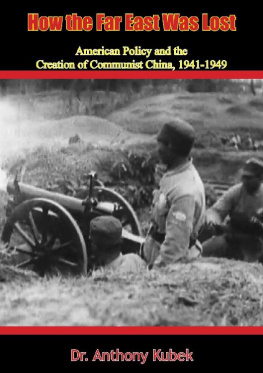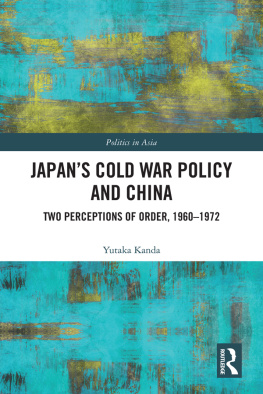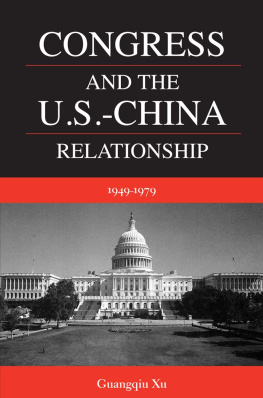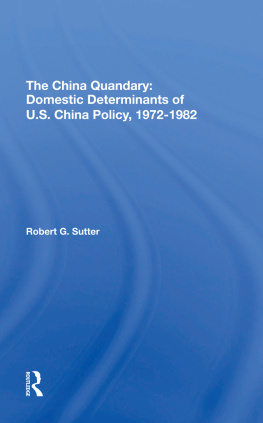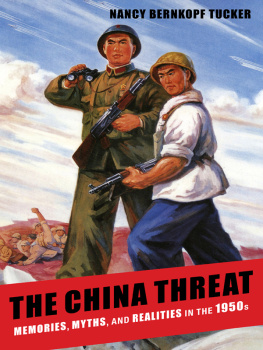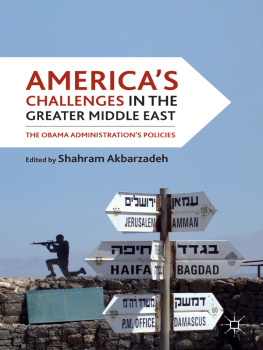
This edition is published by ESCHENBURG PRESS www.pp-publishing.com
To join our mailing list for new titles or for issues with our books eschenburgpress@gmail.com
Or on Facebook
Text originally published in 1963 under the same title.
Eschenburg Press 2017, all rights reserved. No part of this publication may be reproduced, stored in a retrieval system or transmitted by any means, electrical, mechanical or otherwise without the written permission of the copyright holder.
Publishers Note
Although in most cases we have retained the Authors original spelling and grammar to authentically reproduce the work of the Author and the original intent of such material, some additional notes and clarifications have been added for the modern readers benefit.
We have also made every effort to include all maps and illustrations of the original edition the limitations of formatting do not allow of including larger maps, we will upload as many of these maps as possible.
HOW THE FAR EAST WAS LOST
American Policy and the Creation of Communist China, 1941-1949
by
Dr. Anthony Kubek
Chairman, Department of Political Science
University of Dallas
TABLE OF CONTENTS
Contents
DEDICATION
For
Mrs. Aurelia DeHart
and
Michael Kubek, Sr.
PREFACE AND ACKNOWLEDGMENTS
The Far Eastern policy pursued during the Roosevelt-Truman administrations has long been the subject of spirited controversy among historians. This volume is the result of seven years of intensive research into a mass of documentary data dealing with the Communist conquest of China. As I have read these documents, both published and unpublished, it has become apparent that there was a connecting thread drawing them all together. Both a friendly attitude towards Communism on the part of many prominent officials in the Roosevelt-Truman administrations and a belief that in the future, the Soviet and American systems could abide in friendly fashion, led to an American commitment to a futile partnership with the U.S.S.R. in the building of a post-war one world organization. In the pursuit of such an aim, grave sacrifices of vital American interests were made, the war was unnecessarily prolonged and nuclear warfare was needlessly initiated.
As one reviews the actions of Harry Dexter White, Alger Hiss, Owen Lattimore and Lauchlin Currie, it becomes obvious that their interest in Soviet expansion was not merely academic. The threats of Soviet statesmen have weight today primarily because President Franklin D. Roosevelt extended to a badly beaten and disorganized Russia the Lend-Lease help that transformed that nation-in-retreat into a conquering power, which was to move across the map of Europe in giant steps, not halting until it had drawn the new frontiers that now menace world peace. Roosevelt, not Stalin, shaped the growth of modern Russia, and General George C. Marshall achieved an unenviable reputation for guessing wrong in almost every crisis.
In preparing this book I have been particularly fortunate in having access to the private papers of General Patrick J. Hurley, our former Ambassador to Nationalist China. They shed a great deal of significant light upon the China policy of the Roosevelt administration.
At the Hoover War Memorial Library at Stanford University I was able to examine in detail the private diaries and correspondence of General Joseph Stilwell and to learn the exact role played by Vinegar Joe in the China tragedy. Transcripts from the Harry Dexter White Papers in Princeton University library helped me to understand the real meaning of the dubious activities of this financial expert and highly influential official in the Roosevelt administration.
Of great assistance and inspiration to me in the preparation of this monograph has been my friend Professor Charles Callan Tansill. It would be impossible for me to acknowledge more than a fraction of my debt to him. He has advised me throughout the period of writing the manuscript of this book.
I wish to acknowledge my deep gratitude to Mr. George W. DeArmond, Jr., who has generously assisted me in the preparation and editing of the manuscript.
I have been most fortunate in being able to turn to my highly esteemed friend, Dr. Robert Morris, former Chief Counsel of the Internal Security Sub-Committee, for valuable advice concerning the extent of the Communist conspiracy and its influence upon American policy.
I am happy to record my indebtedness to Dr. Stephen Johnsson for his kindness in sending to me some very pertinent transcripts from the Harry Dexter White Papers in the Princeton University library.
To young aspiring professors of history and political science who are interested in a revisionist brand of history, Professor Harry Elmer Barnes has long been an inspiration and a real friend. He not only read chapters of my manuscript but gave me innumerable suggestions that were of great value.
To Professor David Nelson Rowe who was kind enough to read the manuscript.
In particular I wish to express my indebtedness to Professor John A. Carroll, Admiral Maynard Cooke, Mr. Robert McManus, Mr. Bryton Barron, Professor Donald Dozer, Reverend Joseph Costanzo, S.J., Professor Kenneth Colegrove, and General Albert C. Wedemeyer. Their intimate knowledge of many aspects of American policy in the Far East was of great assistance to me.
At the University of Dallas my good friend and colleague, Reverend Edward Maher, has often extended to me wise counsel and friendly encouragement meaning a good deal to me.
There are many personal friends who have helped me at every turn: Congressman Walter Judd, Mr. Lester DeHart, Mrs. Aurelia DeHart, Mr. Michael Kubek, Reverend John Wang, Mr. James Landrum, Mrs. Margaret Wasko, Dr. William Bining, Mr. Thomas Thalken, Mr. Don Lohbeck, Mr. Maurice Rubenstein, Mr. John Kubek, Mr. Peter ODonnell, Jr., Mrs. Joanne Rogers, Mrs. Joan DeArmond, Mrs. Barbara Nun-list, Mr. Gene Glazier, Miss Rosemary Tichy, Mr. Nelson B. Hunt, Mr. Peter Gifford, Mr. Richard D. Bass, Mr. Herbert Hunt, Prof. Robert Wood, and David Kubek.
Last, but certainly not least, I wish to record the assistance of my dutiful wife, Naomi, who has helped me tremendously in every way in the preparation of this book.
ANTHONY KUBEK
University of Dallas
December, 1962
FOREWORD
In this important book Professor Kubek discusses American foreign policy in the Far East during the eventful decade from 1941 to 1949. It was in many ways the most significant period in our long diplomatic history. America is now engaged in a protracted and perilous cold war with the Soviet Union. The background of this war was formed in 1940 when President Roosevelt began to exert upon Japan the economic pressure which produced a climate of opinion that led to war in the Far East. During the decade of the thirties, when America was slowly emerging from a serious depression, our foreign trade with Japan constantly expanded until, by 1938, our exports to that country were as large as our exports to the entire continent of South America. Japan had become our third largest export market.
Under ordinary circumstances, these expanding economic ties would have drawn Japan and the United States close together. But there were other factors that helped to unbalance this uneasy international equation. When Japan purchased increasing amounts of American cotton and thus conferred a boon upon anxious cotton producers in the South, she also increased her volume of manufactured cotton goods and began to push British manufacturers out of the Far Eastern market. This, in part, accounts for a new note of hostility that became manifest in the British attitude towards Japan. It should also be noted that the large American missionary establishment in China was ardently pro-Chinese with reference to the troubled situation in the Far East. The anti-Japanese reports that poured into missionary headquarters in America helped to color American opinion and exerted pressure upon the sensitive Department of State.
Next page
